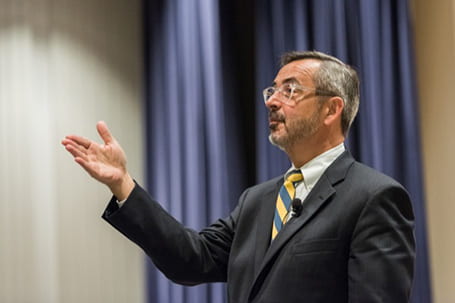
The Campus Coalition for Alcohol and Other Drug Abuse Prevention held its inaugural meeting in spring 2014 to begin expanding and advancing alcohol prevention initiatives at the University of Delaware.
The coalition, co-chaired by Dawn Thompson, vice president for Student Life, and Nancy Chase, director of Student Wellness and Health Promotion, was charged by Provost Domenico Grasso with providing visible, vocal and visionary leadership regarding student drinking and the University’s position regarding it.
Acknowledging that there is no “silver bullet” or right answer for resolving the issues of alcohol abuse and underage drinking on college campuses, Grasso said that the goal of the coalition is to encourage responsible drinking among students who can legally drink and to minimize the risks of drinking for all UD students.
“The coalition is a campus-wide initiative engaging faculty, staff and students from all corners of the UD community in the development of practices that will help reduce the risks associated with alcohol and other drug abuse,” Thompson said. “The formation of the coalition reflects the institution’s commitment to the safety and success of our students.”
Chase added, “The coalition will provide oversight to ensure that institutional concerns about substance abuse are addressed in a comprehensive manner and that University efforts are modeled after evidence-based, promising practices within the discipline of college health promotion.”
Changing the culture
“According to the National Institute on Alcohol Abuse and Alcoholism (NIAAA), having a functioning campus community coalition for substance abuse prevention is a best practice in college alcohol and drug prevention efforts,” said Chase.
NIAAA is one of the 27 institutes and centers that comprise the National Institutes of Health (NIH). NIAAA supports and conducts research on the impact of alcohol use on human health and well-being.
Through its work, the NIAAA Task Force developed a “3-in-1 Framework” strategy showing that effective interventions need to occur simultaneously at three distinct levels — individual, student body and community — for optimal success.
“We would be remiss if we did not form a functioning coalition to address our prevention efforts both on campus and in the greater Newark community,” Chase said. “This group will eventually be expanded in thoughtful ways to bring in key representation from our community partners, so that efforts which will span the entire environment in which our students live and our institution functions can be implemented for their maximum preventative reach.”
Engaging in ongoing conversations
Goals of the coalition include familiarizing the campus community with the factors associated with excessive drinking and identifying and implementing environmental management strategies to address these factors.
“One specific goal of the coalition will be to encourage more attention to these issues by simply keeping campus stakeholders more regularly informed about the issues which emerge as a result of students’ risky substance use, particularly drinking,” Chase said. “We will be utilizing many means to keep campus stakeholders engaged in the ongoing conversation about how we all can work together to shape a safer and healthier campus environment for all our community members, especially our students.”
The offices of the President and the Provost will be kept apprised of the coalition’s progress, Thompson said.
Current initiatives
In 2011, Student Wellness and Health Promotion was awarded a Strategic Prevention Framework State Incentive Grant (SPF-SIG) to implement a community-based effort to prevent underage and binge drinking among 12-25 years olds.
As a result of the funding, Student Wellness and Health Promotion launched initiatives that support the six prevention strategies established by the Center for Substance Abuse Prevention: information dissemination, education, alternative activities, community based processes, problem identification and referral, and environmental changes.
The grant is part of a five-year cooperative agreement between the Substance Abuse Mental Health Services-Center for Substance Abuse Prevention and the Office of the Governor.
About the Division of Student Life
The Division of Student Life supports the educational mission of the University through student advocacy, innovative services and programs that promote student learning, personal development and well-being, and academic success. The division fosters inclusive communities, facilitates student engagement and leadership development, and promotes responsible citizenship.
About Student Wellness and Health Promotion
Student Wellness and Health Promotion, a department within the Division of Student Life, works to engage all members of the University community in health promotion and prevention strategies that empower students to develop skills and competencies that support healthy choices and academic success as a foundation for lifelong development.
